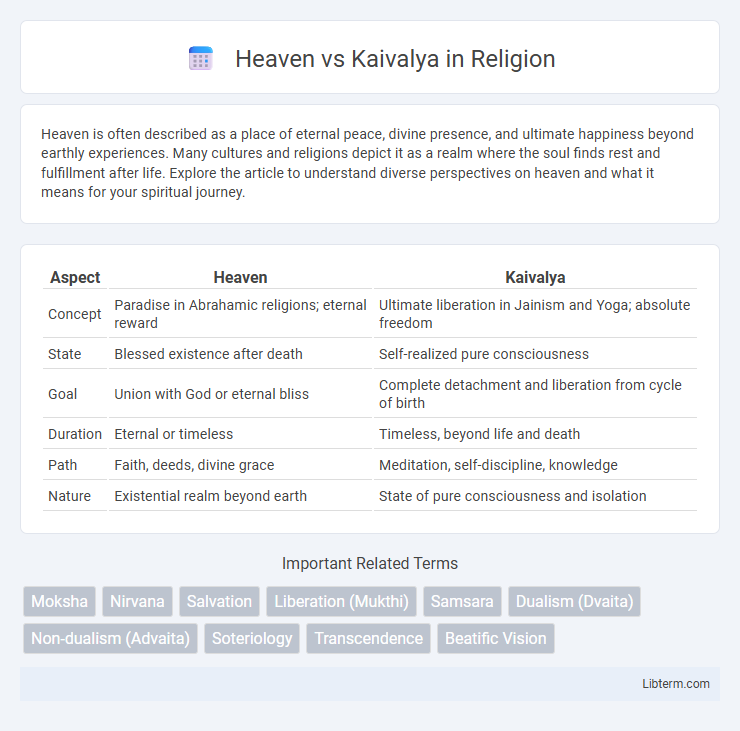Heaven is often described as a place of eternal peace, divine presence, and ultimate happiness beyond earthly experiences. Many cultures and religions depict it as a realm where the soul finds rest and fulfillment after life. Explore the article to understand diverse perspectives on heaven and what it means for your spiritual journey.
Table of Comparison
| Aspect | Heaven | Kaivalya |
|---|---|---|
| Concept | Paradise in Abrahamic religions; eternal reward | Ultimate liberation in Jainism and Yoga; absolute freedom |
| State | Blessed existence after death | Self-realized pure consciousness |
| Goal | Union with God or eternal bliss | Complete detachment and liberation from cycle of birth |
| Duration | Eternal or timeless | Timeless, beyond life and death |
| Path | Faith, deeds, divine grace | Meditation, self-discipline, knowledge |
| Nature | Existential realm beyond earth | State of pure consciousness and isolation |
Understanding the Concept of Heaven
Heaven is traditionally understood as a transcendent realm of eternal bliss and divine presence, often depicted in various religious texts as the ultimate reward for virtuous living. It serves as a cosmic abode where souls experience perpetual happiness, free from earthly suffering and limitations. The concept of Heaven emphasizes a spiritual destination externally granted, contrasting with inner liberation or self-realization found in philosophies like Kaivalya.
Exploring the Meaning of Kaivalya
Kaivalya represents the ultimate state of liberation and self-realization in Indian philosophy, transcending the ephemeral pleasures of heaven. Unlike the temporary bliss of heaven, Kaivalya signifies absolute freedom from the cycle of birth and death, embodying pure consciousness and detachment. It is the realization of the true self beyond physical existence, where the soul exists in perpetual isolation and supreme bliss.
Origins: Heaven in World Religions
Heaven, as depicted in major world religions such as Christianity, Islam, and Hinduism, originates from ancient cosmologies describing it as a divine realm or paradise where souls experience eternal bliss. In Christianity and Islam, Heaven is often seen as the ultimate reward for righteousness and faith, symbolizing closeness to God and moral perfection. Hinduism presents similar concepts through the idea of Swarga, a heavenly abode for virtuous souls, distinct from the ultimate liberation called Kaivalya, which transcends all worldly and heavenly realms.
Kaivalya in Eastern Philosophies
Kaivalya in Eastern philosophies, particularly in Yoga and Samkhya traditions, represents the ultimate state of liberation characterized by absolute detachment and self-realization beyond physical existence. Unlike the concept of Heaven, which is often viewed as a paradisiacal afterlife realm, Kaivalya signifies the transcendence of the cycle of birth and death (samsara) through pure consciousness and isolation of the self (purusha) from material nature (prakriti). This state of supreme freedom culminates in eternal bliss and unity with the true self, distinct from temporal rewards or divine realms.
Salvation and Liberation: Key Differences
Heaven is often viewed as a temporary realm where souls experience bliss as a reward for righteous living, representing salvation within many religious traditions. Kaivalya, in contrast, signifies ultimate liberation in Hindu and yogic philosophy, denoting complete freedom from the cycle of birth and rebirth (samsara). While salvation leads to eternal peace in a divine abode, liberation (Kaivalya) transcends all material existence and dualities, achieving absolute self-realization and spiritual emancipation.
The Role of Deities: God vs Self-Realization
Heaven is often depicted as a divine realm governed by gods who reward devotees, emphasizing external grace and worship of deities. Kaivalya, in contrast, represents the ultimate state of self-realization in which the individual transcends all gods and external forces, achieving absolute liberation and unity with the Self. This path centers on inner awakening and the dissolution of ego, highlighting self-effort rather than divine intervention.
Afterlife Promises: Eternal Bliss or Ultimate Freedom
Heaven offers eternal bliss characterized by perpetual happiness, divine presence, and reward-based afterlife experiences rooted in religious doctrines. Kaivalya, in contrast, promises ultimate freedom, representing liberation from the cycle of birth and death (samsara) and transcending material existence to achieve true self-realization and spiritual emancipation. While Heaven emphasizes eternal enjoyment within a divine realm, Kaivalya centers on achieving absolute detachment and self-mastery beyond worldly attachments.
Paths to Attainment: Faith versus Self-Discipline
Heaven is often depicted as a reward attained through faith, devotion, and divine grace, emphasizing surrender and belief in a higher power as the primary path. Kaivalya, in contrast, represents ultimate liberation achieved through rigorous self-discipline, meditation, and the realization of the self as distinct from material existence. The key distinction lies in reliance on external divine favor for Heaven versus inward-focused spiritual practices for Kaivalya's attainment.
Philosophical Implications of Heaven and Kaivalya
Heaven represents a state of bliss achieved through divine grace or merit, often characterized by eternal reward and paradise in many religious traditions, highlighting the dualistic view of existence where the soul attains happiness separate from material suffering. Kaivalya, rooted in Samkhya and Yoga philosophy, signifies absolute liberation from the cycle of birth and death through realization of the self's distinctness from the material world, emphasizing non-duality and self-realization beyond transient pleasures. Philosophically, Heaven implies continuation within a cosmic order governed by dharma, whereas Kaivalya embodies transcendence of all cosmic bonds and the ultimate freedom of pure consciousness.
Contemporary Relevance: Modern Interpretations
Heaven and Kaivalya represent distinct spiritual goals, with Heaven often viewed as a reward-based, eternal paradise in Abrahamic traditions, while Kaivalya in Indian philosophy signifies ultimate liberation and self-realization beyond the cycle of rebirth. Contemporary relevance centers on Heaven appealing to believers seeking moral order and afterlife certainty, whereas Kaivalya attracts those pursuing inner freedom and profound existential understanding through meditation and yogic practices. Modern interpretations increasingly frame Heaven as symbolic of collective moral aspirations, while Kaivalya is embraced in secular contexts for its psychological insights into detachment and self-mastery.
Heaven Infographic

 libterm.com
libterm.com